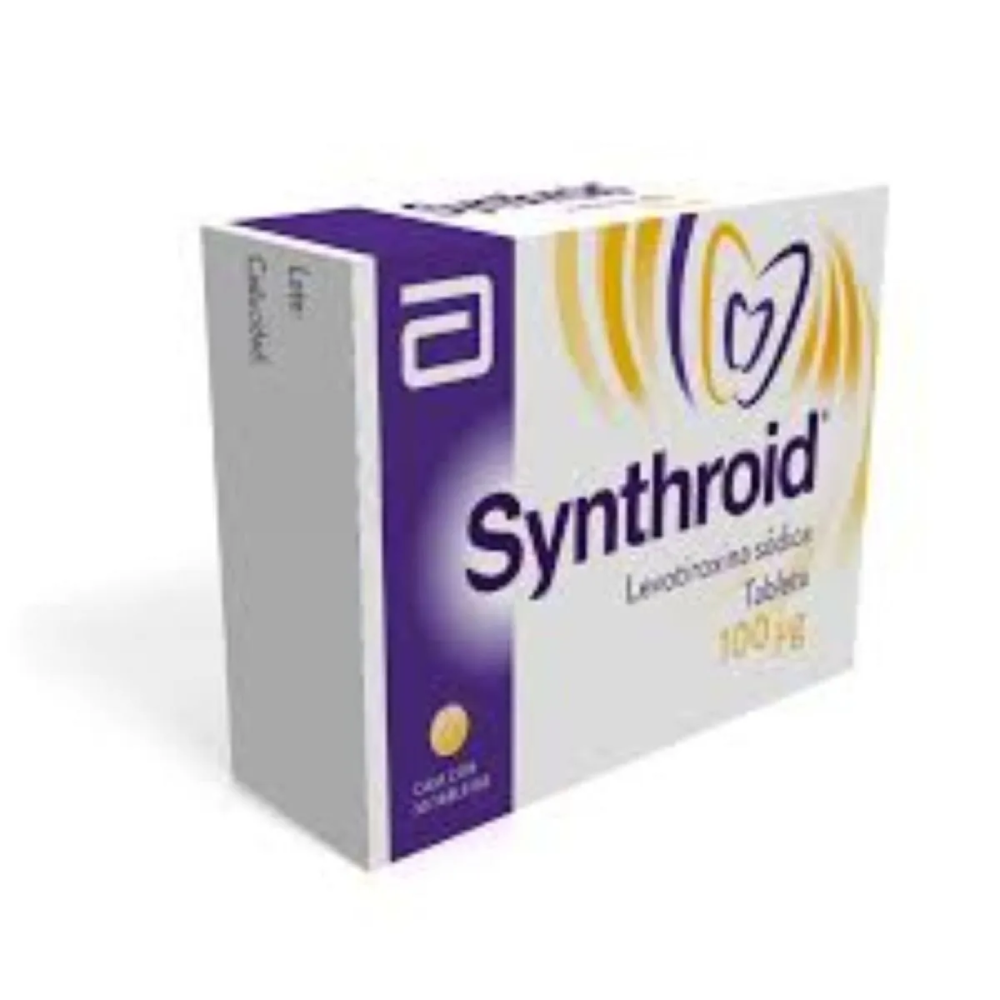Synthroid 100 mcg Tablet
Synthroid 100 mcg Tablet is used to treat hypothyroidism. It contains thyroxine, which compensates for the lack of hormone produced by the thyroid gland. Order now!
$77.81 – $191.04Price range: $77.81 through $191.04
Add to wishlist Add to compareAsk about productDescription
| SKU | MOP4776 |
| USA Brand Name | Levothyroxine |
| Strength | 100mcg |
| Generic Name | Thyroxine/Levothyroxine (100mcg) |
| Manufacturer | Akumentis Healthcare Ltd |
Synthroid 100 Mcg Tablet (Thyroxine/ Levothyroxine)
Generic Name for Synthroid 100 Mcg Tablet:
The generic version of Synthroid 100 mcg Tablet is Thyroxine.
Equivalent US Brand for Synthroid 100 Mcg Tablet (Thyroxine):
- Levothyroxine
Overview of Synthroid 100 Mcg Tablet (Thyroxine)
Synthroid 100 mcg Tablet contains Thyroxine, an active ingredient used to treat hypothyroidism, a condition where the thyroid gland is underactive. This medication compensates for the insufficient production of thyroid hormones, which helps to regulate energy levels and metabolism. Hypothyroidism is more common in women, especially those over 40 years of age. Synthroid should only be taken as per a doctor’s prescription.
Manufacturer:
Synthroid 100 mcg Tablet is manufactured by Akumentis Healthcare Ltd.
Strength:
Synthroid 100 mcg Tablet contains 100 mcg of Thyroxine. It is also available in different strengths from various online pharmacies and medical supply stores.
Uses of Synthroid 100 Mcg Tablet (Thyroxine):
Synthroid 100 mcg Tablet is used to treat the following conditions:
- Hypothyroidism
- Thyroid cancer
- Myxedema coma
How Synthroid 100 Mcg Tablet (Thyroxine) Works:
Synthroid 100 mcg Tablet contains Thyroxine, a synthetic version of the hormone naturally produced by the thyroid gland. It helps replace the thyroid hormones that the body is unable to produce in sufficient amounts, alleviating symptoms of hypothyroidism such as fatigue, weight gain, and depression.
Precautions Before Using Synthroid 100 Mcg Tablet (Thyroxine):
Ensure that:
- You are not suffering from any severe illnesses.
- You are not allergic to Thyroxine.
- Your doctor is aware of your medical history, including any pre-existing conditions, medications, surgeries, lifestyle habits, and diet.
What to Avoid While Taking Synthroid 100 Mcg Tablet (Thyroxine):
- Avoid driving if you experience dizziness.
- Avoid alcohol consumption.
- Do not take any medication without consulting your doctor first.
When Not to Use Synthroid 100 Mcg Tablet (Thyroxine):
Do not take Synthroid 100 mcg Tablet if you:
- Have a known allergy to Thyroxine.
- Have liver or kidney issues.
- Have Thyrotoxicosis.
- Have adrenal insufficiency.
- Have recently had a heart attack.
Tell Your Doctor If You:
- Have an allergy to this medication.
- Are using alcohol or other medications.
- Experience symptoms like diarrhea, nervousness, irritability, or sleep disturbances.
- Have liver or kidney conditions.
- Have infections.
Dosage:
The dosage of Synthroid 100 mcg Tablet is determined by your doctor based on your specific condition. It’s important to take this medication as prescribed and at the same time each day. Typically, it is taken on an empty stomach for optimal absorption.
How to Take Synthroid 100 Mcg Tablet (Thyroxine):
Swallow the tablet whole without chewing, crushing, or breaking it. Take it at least one hour before meals or two hours after meals. Avoid consuming food, milk, or tea during this time for optimal effectiveness.
For How Long Should You Continue Using Synthroid 100 Mcg Tablet (Thyroxine):
Follow your doctor’s recommendations on how long to take Synthroid 100 mcg Tablet. Do not stop taking it suddenly or adjust your dosage without consulting your doctor first.
Overdose:
In case of an overdose, seek emergency medical help immediately. Your doctor will provide urgent treatment as needed.
Missed Dose:
If you miss a dose, take it as soon as you remember, unless it’s time for your next dose. In that case, skip the missed dose and continue with your regular schedule. Do not double the dose to make up for the missed one.
Possible Side Effects of Synthroid 100 Mcg Tablet (Thyroxine):
- Shaking or trembling
- Headaches
- Nausea or vomiting
- Diarrhea
- Abdominal cramps
- Nervousness and irritability
- Insomnia
- Excessive sweating
- Chest pain
- Rapid or irregular heartbeat
- Weight loss
- Restlessness
Drug Interactions:
Several medications can interact with Synthroid 100 mcg Tablet, potentially altering its effects or causing unwanted side effects. Discuss any other drugs or supplements you’re taking with your doctor to avoid adverse reactions. Notable interactions include:
- Carbamazepine
- Phenytoin
- Warfarin
- Rifampicin
- Insulin
- Antacids containing calcium, magnesium, or aluminum
Warnings and Precautions:
Synthroid 100 mcg Tablet may worsen conditions such as:
- Liver or kidney disease
- Infections
- Allergic reactions
- It is not recommended for elderly patients without careful supervision.
- You will need regular blood tests to monitor your liver, kidney, and hormone levels during treatment.
Storage Instructions:
Store Synthroid 100 mcg Tablets in a cool, dry place at room temperature, away from direct sunlight. Ensure the tablets remain intact and are not damaged during storage.
Additional information
| Pack Size | 20 Tablet/s, 40 Tablet/s, 60 Tablet/s |
|---|---|
| Form | Tablets |
Related products
-
-
+ wishlist+ compare
Adequet 100 Tablet
$32.34 – $77.73Price range: $32.34 through $77.73Select options -
-
-


Reviews
There are no reviews yet.